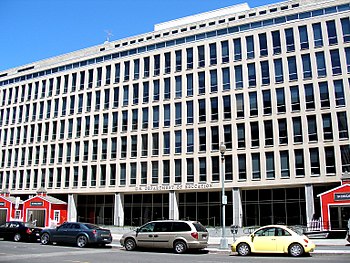
A spectre is haunting Earth — the spectre of freedom. All the powers of the existing order have entered into a holy alliance to exorcise this spectre: Pope and Drug Czar, Tillerson and May, European progressives and Chinese financial police.
Where is the party in opposition that has not been decried as anarchistic by its opponents in power? Where is the opposition that has not hurled back the branding reproach of anarchism, against the more advanced opposition parties, as well as against its reactionary adversaries?
Yes, I’ve swiped those first two paragraphs from Karl Marx’s Communist Manifesto and reformulated them for our day. Whatever Marx’s faults as an economic, social and political theorist (and they were many), he was on to something when he took notice of the convulsions wrought by the Industrial Revolution.
One side effect of that revolution — which raised the standard of living in what we now call the “developed” nations so much that the monarchs of the 19th century look like paupers compared to the average middle class American of today — was centralization. Production moved from home workshops into factories. The fragmented political and economic power of small feudal fiefdoms was consolidated into the hands of national political classes and central planners.
Three quarters of a century into the Information Revolution, its ramifications are finally becoming clear. We’re decentralizing.
With the press of a button, a writer can make her work available to a global audience without the large centralized publishing company she’d have had to beg for help even 25 years ago.
Taxi monopolies find themselves in mortal combat with apps which connect individual riders to individual drivers; hotel monopolies with apps which connect lodgers to spare rooms in homes.
The political class and its cronies have effectively lost the war to save the centralized “intellectual property” monopolies, and are now losing their grip on money as cryptocurrencies begin to limit their ability to regulate and tax commerce.
This revolution is far from finished, but it is in principle already possible for a retail clerk in Wichita to talk, share, and trade with a chef in Smolensk or a mechanic in Singapore — without the permission of Donald Trump, Vladimir Putin, or Lee Hsien Loong.
When Theresa May calls for Internet censorship to “stop terrorism” or Charles Schumer tries to suppress Bitcoin “to protect the consumer,” the above is what they are actually fighting desperately to reverse.
They know they’re losing their power over you. They want it back. But their only weapon is their ability to convince you that you need them. You don’t.
Government as we know it is disappearing, and that’s a good thing. What’s next? Who knows? I look forward to finding out.
Thomas L. Knapp (Twitter: @thomaslknapp) is director and senior news analyst at the William Lloyd Garrison Center for Libertarian Advocacy Journalism (thegarrisoncenter.org). He lives and works in north central Florida.
PUBLICATION HISTORY
- “Mere Anarchy: The Center Cannot Hold,” by Thomas L. Knapp, OpEdNews, 06/20/17
- “Mere Anarchy: The Center Cannot Hold,” by Thomas L. Knapp, Key West: The Newspaper [Florida], 06/23/17
- “Mere anarchy — the center cannot hold,” by Thomas L. Knapp, Newberry, South Carolina Observer, 06/26/17
- “Mere Anarchy: The Center Cannot Hold,” by Thomas L. Knapp, Florence, Alabama Courier Journal, 06/27/17
- “Mere anarchy: The center cannot hold,” by Thomas L. Knapp, Sevierville, Tennessee Mountain Press, 06/27/17


